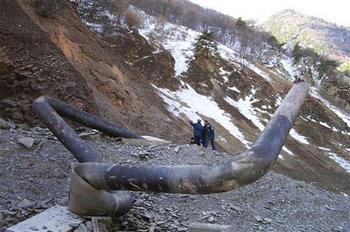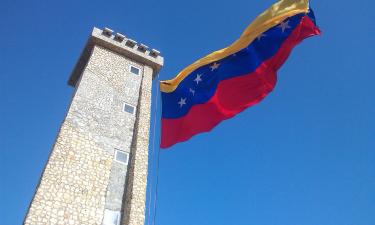Gas explosion standoff continues between Russia and Georgia
Russia denies accusations from Georgian President Saakashvili who claimed that Russia organized the explosion to punish his country for its pro-Western stance
On Monday Georgia resumed receiving gas after the explosions that had cut fuel supplies from Russia. Gas shortages led to accusations from the Georgian officials who said that Russia deliberately triggered an energy crisis.
Russia says Sunday's two explosions in its North Ossetia province, knocking out the main pipeline taking gas to Georgia, were the work of pro-Chechen insurgents and warned Georgian leaders to tone down their rhetoric.
Click here to see photographs of the gas explosion
The supply cut is the latest to hit Russia's ex-Soviet neighbors, some of which say the Kremlin is using energy supply as a political weapon against those which have opted to shift toward the West and away from Moscow's sphere of influence. 
The additional gas for Georgia is coming from neighboring Azerbaijan which takes much of its gas via a separate pipeline from Russia. Officials with Russian gas monopoly Gazprom said the company was pumping an extra 2-3 million cubic meters a day to Azerbaijan for Georgia which is experiencing an unusually harsh winter, according to Reuters.
When repair crews came to the place of the accident it became obvious that it was a planned sabotage. Experts say that the pipeline was badly damaged by quite powerful hand-made explosives.
The experts could not make both ends meet about why Russia had arranged such an accident. Georgian officials already developed a clear version of what had happened. They said that the explosions were Russia's response to Georgian requirement to withdraw peacekeepers from South Osetia.
Georgian President Mikhail Saakashvili accused Russia of being behind the explosions to punish his country, presumably for its pro-Western policies. The Russian Foreign Ministry, in response, said the allegation was "an instance of hysteria and bacchanalia”, Washingtonpost.com reports.
Explosions in southern Russia on Sunday morning severed the country's natural gas pipelines to Georgia, swiftly plunging Russia's neighbor into heat and electricity shortages and causing a diplomatic flare-up between the nations. Two more explosions hours later severed one of Russia's main electricity cables to Georgia, deepening the electricity shortage even as the gas supply in Georgia dwindled. Russia supplies Georgia with all of its natural gas.
The break in supply - which also led to shortages in Armenia, which receives gas from Russia after it passes through the Georgian pipeline network - raised fresh questions about Russia's reliability as an energy partner and exposed anew the tensions between Russia and Georgia, a nation formerly under Soviet rule that has spurned Moscow in recent years, says New York Times.
Vladimir Chikvishvili, Russian Ambassador to Georgia, evaluates explosion of the Russian-Georgian gas pipeline as an act of terrorism. According to him, accusing Russia of diversions and provocations against such background is unacceptable for Russian diplomats.
Chikvishvili stated at a press conference on Monday that Russian law enforcement bodies would investigate the fact; guilty people and consumers of the crime will be punished.
Russian national power utility RAO Unified Energy System called the blasts a "terrorist act.'' The blasts destroyed three supports and damaged a fourth, the state-run company said in an e-mailed statement today. Unified Energy export unit ZAO Inter RAO UES resumed exports today of about 105 megawatts, more than triple the amount that was being supplied before the attack, using reserve power lines, Inter RAO spokesman Boris Zverev said today. The company also helped arrange as much as 40 megawatts of power from Azerbaijan, he said.
Source: agencies
Photo: AP
Discuss this article on Pravda.Ru English Forum
Subscribe to Pravda.Ru Telegram channel, Facebook, RSS!




